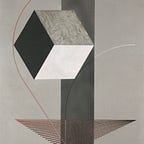Descartes’ Dilemma
On epistemology and studying philosophy in general.
There are more books in existence than days of my life. This fact alone would be a tragedy unto itself, if it wasn’t for the further catastrophe that am I terrible at making a good use of the time I do have. But, when I am able to pull my mind from its extension; to untangle it from the cobwebs of sensory experience; and to save its breath from the dilution of my pleasure receptors by twenty-first century living; then it is that my attention is bent, decisively, towards philosophy.
Being acutely and very painfully aware of the expiration date that has been stapled to me, I can’t help but to consider the question of what is the best way to spend my time. Deciding on what to focus my thoughts towards is especially hard for me, because I am someone whose interests achieve equal depth as they do breadth. I take pleasure, if not pride, on the fact that I am able to write equally well about the Aeneid as I am able to write about politics or metaphysics. (To judge how ‘well’ that is exactly I must submit to your arbitration, dear reader). But, my point is that I enjoy learning about all sorts of things. Life is so wonderfully interesting, just as its totality is so tortuously out of grasp.
I have been reading Descartes’ Discourse of Method, and, in it, he writes about the difficulty of writing an all encompassing philosophical treatise. Nevertheless, he writes:
“So, fearing lest I should not be able to comprise my discourse all that was in my mind, I resolved to expound singly, though at considerable length, my opinions regarding light.”
Descartes’ light is, of course, epistemology– the meta-philosophy. His analogy translates well into the macrocosm of academia in general. If we are interested in everything within the world around us, we may be interested in understanding what it is that allows us to perceive it at all. Similarly, if we are interested in many different strands of thought, we may find it enjoyable to study thought itself.
